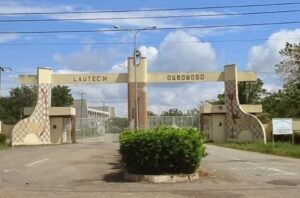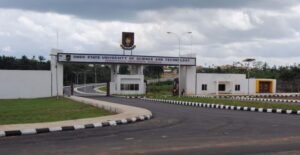This guide ranks the top 10 best state universities in Nigeria for 2025, providing insights based on credible rankings and the strengths of each institution.
Our list is compiled by considering factors commonly emphasized by popular global and national ranking bodies such as Times Higher Education (THE), EduRank, and the Scimago Institutions Rankings.
These organizations evaluate universities using criteria such as research output, academic reputation, and teaching quality.
READ ALSO: Top 10 Finest States in Nigeria and Their Capitals
What Are The Top 10 Best State Universities In Nigeria In 2025?
Here are the 10 best state universities in Nigeria currently:
| Rank | University | Location (State) |
|---|---|---|
| 1 | Ladoke Akintola University of Technology (LAUTECH) | Oyo State |
| 2 | Lagos State University (LASU) | Lagos State |
| 3 | Ekiti State University (EKSU) | Ekiti State |
| 4 | Delta State University (DELSU) | Delta State |
| 5 | Rivers State University (RSUST) | Rivers State |
| 6 | Ondo State University of Science and Technology (OSUSTECH) | Ondo State |
| 7 | Olabisi Onabanjo University (OOU) | Ogun State |
| 8 | Ambrose Alli University (AAU) | Edo State |
| 9 | Enugu State University of Science and Technology (ESUT) | Enugu State |
| 10 | Plateau State University (PLASU) | Plateau State |
READ ALSO: 10 Major Cities In Abuja’s Federal Capital Territory (FCT)
1. Ladoke Akintola University of Technology (LAUTECH), Oyo State

Ladoke Akintola University of Technology (LAUTECH), located in Ogbomoso, Oyo State, is recognized as one of the best state universities in Nigeria.
Established on April 23, 1990, it was originally known as Oyo State University of Technology (OSUTECH). The name was later changed in 1991 to honor Chief Ladoke Akintola, a notable Nigerian statesman.
For years, LAUTECH was jointly owned by Oyo and Osun States. However, on November 20, 2020, full ownership was transferred to Oyo State.
LAUTECH has two main campuses: the Ogbomoso campus, which houses most faculties and administrative offices, and the Iseyin campus, which hosts the Faculty of Agriculture and Renewable Natural Resources.
With 12 faculties offering undergraduate and postgraduate programs, LAUTECH’s academic strength is in areas such as engineering, medical sciences, computing, and environmental studies. It has around 30,000 students and over 3,000 staff.
LAUTECH is ranked as the best state university in Nigeria and the best university of technology in the country. It also ranks 4th overall in Nigeria and 74th in Africa based on research output.
2. Lagos State University (LASU), Lagos State

Lagos State University (LASU), located in Ojo, Lagos, is one of Nigeria’s leading state-owned institutions and a top-ranked university in West Africa.
Founded in 1983 during the administration of Lateef Jakande, LASU was created to provide affordable, quality education for Lagos residents and Nigerians at large.
It started as a non-residential, multi-campus institution, with campuses in Ojo, Ikeja, and Epe. LASU has grown into a hub of academic excellence, with over 70 programs across faculties such as Arts, Education, Engineering, Law, Medicine, Science, and Social Sciences.
The Faculty of Communication and Media Studies, which became a full faculty in 2022, houses LASU Radio 95.7 FM, used for student training.
LASU has over 35,000 students and admitted nearly 12,600 new students in the 2024/2025 session out of more than 50,000 applicants.
It is highly competitive. In global rankings, LASU ranks among the top 600 universities globally (THE, 2020) and is named the best university in West Africa by Greenmetrics.
3. Ekiti State University (EKSU), Ekiti State

Ekiti State University (EKSU), located in Ado-Ekiti, is currently ranked the best-performing state university in Nigeria according to the 2025 Times Higher Education rankings.
It placed 12th among 270 universities nationwide, federal, private, and state combined. Originally founded on March 30, 1982, as Obafemi Awolowo University, Ado-Ekiti, EKSU has grown under different names but with a consistent mission: academic excellence.
The university, established by Chief Michael Adekunle Ajasin, now thrives under the leadership of Vice Chancellor Prof. Joseph Babatola Ayodele, with strong support from the Ekiti State Government and the alumni Governor, Mr. Biodun Oyebanji.
The monthly subvention to the school rose from N261 million to N410 million, improving infrastructure, staff welfare, and campus development.
In April 2025, EKSU achieved full NUC accreditation for 18 programmes across disciplines like Engineering, Law, Education, Administration, and Sciences. UTME cut-off is 140, but courses like Medicine (250), Law (240), and Nursing (220) require much higher scores.
READ ALSO: Top 10 Richest Local Government In Enugu state, Nigeria
4. Delta State University (DELSU), Delta State

Delta State University, popularly known as DELSU, is one of Nigeria’s top state-owned universities. Located in Abraka, with additional campuses in Oleh and Anwai (Asaba), DELSU was officially established on April 28, 1992.
However, it was a teacher training college before Nigeria’s independence. With time, it transformed into a College of Education and later a full-fledged university.
DELSU has a list of undergraduate and postgraduate programs across faculties like Arts, Law, Sciences, Engineering, Education, Health Sciences, and Management Sciences.
Under the leadership of Prof. Andy Egwunyenga, new programs such as Dentistry, Medical Laboratory Science, and Biotechnology have been introduced.
The university also launched an Open and Distance Learning (ODL) program to support flexible education. Its tuition is among the lowest in Nigeria, about ₦23,000 per session. Hostel fees are around ₦10,000.
DELSU’s medical school gained full accreditation in 2010, and the university continues to maintain strong academic standards.
Between 2020 and 2023, it ranked 22nd in Nigeria, 3rd among state universities, and 1st in the South-South/South-East regions based on Scopus publications.
5. Rivers State University (RSUST), Rivers State

Rivers State University (RSU), formerly RSUST, is one of Nigeria’s leading state-owned universities. It is the first technological university in Nigeria and the first state university in the Niger Delta.
The university operates under the leadership of Professor Isaac Zeb-Obipi as Vice-Chancellor (appointed in March 2025), and Chancellor Sidi M. Bage CON, JSC (rtd).
With over 3,000 staff and more than 28,000 students, RSU offers many academic opportunities. RSU has seven faculties, including Engineering, Agriculture, Law, and Environmental Sciences, plus a Postgraduate School.
The university runs 37 undergraduate and 86 postgraduate programs. With plans to relocate to a new ultra-modern campus in Greater Port Harcourt, RSU aims to join the world’s top 1,000 universities. The UTME cut-off mark is 190 for 2024/2025.
6. Ondo State University of Science and Technology (OSUSTECH), Ondo State

Now officially called Olusegun Agagu University of Science and Technology (OAUSTECH), this university is one of the best state-owned institutions in Nigeria, located in Okitipupa, Ondo State.
Formed in 2008 by the Ondo State government, it began academic activities in January 2011. It was renamed in honor of former governor Olusegun Agagu, a strong advocate for science and innovation.
OAUSTECH is focused on science, technology, and engineering. The university started with the School of Science, which offered programs in Biological, Chemical, Mathematical, and Physical Sciences.
At the moment, it offers 11 programs, including Biochemistry, Computer Science, and Fisheries. Other faculties include Engineering and Engineering Technology, Management Sciences, Nursing and Allied Health Sciences, and Agriculture and Environmental Sciences.
Courses like Civil Engineering, Mechanical Engineering, Accounting, Medical Laboratory Science, and Public Health are available. For the 2024/2025 session, the minimum JAMB cut-off mark is 150.
OAUSTECH is fully accredited by the National Universities Commission (NUC), and it’s one of Nigeria’s most promising tech-focused state universities.
7. Olabisi Onabanjo University (OOU), Ogun State

Olabisi Onabanjo University (OOU), located in Ago-Iwoye, Ogun State, is one of Nigeria’s top state universities. Established on July 7, 1982, and originally named Ogun State University, it was renamed in 2001 to honor Chief Olabisi Onabanjo, the visionary behind its creation.
OU operates a multi-campus structure spread across the state. The main campus is in Ago-Iwoye, while other campuses are in Ibogun (Engineering), Ayetoro (Agriculture), Sagamu (College of Medicine), and Ikenne (Pharmacy).
The university offers NUC-accredited academic programs including bachelor’s, master’s, and doctorate degrees across fields like Arts, Law, Science, Medicine, and Engineering.
OOU admission requirements include UTME scores and post-UTME screening, with a competitive acceptance rate of 60–70%.
With lively student life, modern campus facilities, and a growing reputation, currently ranked 31st in Nigeria by 4icu.org.
8. Ambrose Alli University (AAU), Edo State

Ambrose Alli University (AAU) is one of Nigeria’s most respected state-owned universities. Located in Ekpoma, Edo State, it was established in 1980 by Professor Ambrose Folorunsho Alli, the then governor of old Bendel State.
Officially accredited by the National Universities Commission (NUC), AAU offers degrees in agriculture, arts, sciences, education, law, engineering, medicine, and more.
Its Faculty of Law is considered one of the best in the country. The university has three campuses, including the main campus in Ekpoma and two others in Emu and near the College of Medical Sciences.
Facilities include student hostels, a university health center, a digital learning system (AAU-LMS), and a robust ICT center.
In 2025, Governor Senator Monday Okpebholo increased the monthly government subvention from N41 million to N500 million. A new governing council, led by Chief Dan Osi Orbih, was also appointed to restore the university’s glory.
READ ALSO: What Does A Political Impeachment Mean In Nigeria?
9. Enugu State University of Science and Technology (ESUT), Enugu State

Enugu State University of Science and Technology (ESUT) is one of Nigeria’s best state universities. ESUT has six schools and about 30 departments, offering both undergraduate and postgraduate programs.
School of Postgraduate Studies, founded in 1982, supports research and staff development. With over 45,000 students, ESUT is a large institution situated in the city of Enugu.
The university has excellent facilities, including a well-equipped library, modern classrooms, and strong administrative support.
ESUT is accredited by the National Universities Commission (NUC) and was ranked around #40 in Nigeria and #140 in Africa in the 2025 SAA Best University Rankings.
10. Plateau State University (PLASU), Plateau State

Plateau State University (PLASU), located in Bokkos, Plateau State, is one of Nigeria’s rising state-owned universities.
Established in 2005 and officially ranked as the 66th university in Nigeria, PLASU has steadily grown in academic reputation.
It now boasts seven faculties and 23 departments, including newly approved programs such as MBBS in Medical Sciences, Pharm D., and B.Sc. Statistics, B.A. Religious Studies, and professionally accredited Law and Nursing degrees.
PLASU began operations in 2007, experienced a temporary closure, and successfully resumed in 2011. As of mid-2023, it employs 677 staff members and continues expanding its digital and academic infrastructure.
Admission is estimated to have a 66% acceptance rate. PLASU ranks 126th nationally, 698th in Africa, and 12,097th globally (EduRank 2025).

